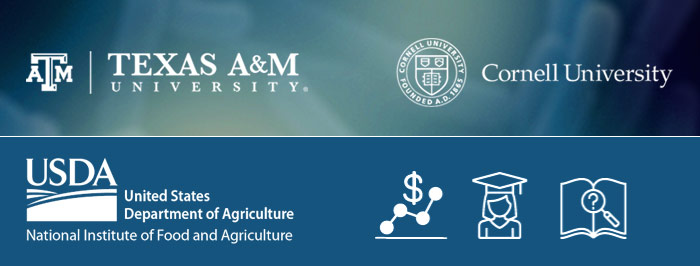
The $300,000 federal grant will fund research to develop and study the impact of a comprehensive collection of competency-based educational resources on antimicrobial resistance to aid veterinary education programs throughout the United States.
Dr. Kevin Cummings, principal investigator for Cornell University stated, “Antimicrobial resistance poses an increasingly serious threat to global health and veterinarians must be properly equipped to assume leadership roles in addressing this challenge. Crucial to the success of the AMR mitigation effort is the need to educate a wide variety of stakeholders about proper antimicrobial stewardship in production agriculture.”
The three-year grant will finance research focused on the development of multidisciplinary, problem-based lessons on antimicrobial resistance, the creation of an online platform to share educational resources with all veterinary colleges in the United States and expanding the pipeline for underrepresented student populations regarding career opportunities in food and agricultural sciences, veterinary medicine, and public health.
Nicola Ritter, principal investigator for Texas A&M University, will lead efforts to create the online platform and implement the outreach campaign. The Center for Educational Technologies at Texas A&M University will share the lessons created from this project with all U.S. veterinary colleges on an open, online platform.
As a part of the outreach campaign, the Texas A&M team will share lessons on antimicrobial resistance topics suitable for undergraduate audiences to four universities within the Texas A&M System that have significant under-represented student populations including Prairie View A&M University, West Texas A&M University, Texas A&M Kingsville, and Tarleton State University.
Ritter stated, “the undergraduate outreach campaign dovetails well with Texas A&M’s initiative to expand veterinary education, research, and outreach into several rural areas of Texas with under-represented student populations.
This multi-institutional project consists of researchers from Texas A&M University and Cornell University. Multiple groups at Texas A&M have joined the project, including the Center for Educational Technologies, the College of Veterinary Medicine & Biomedical Sciences and the College of Education & Human Development. These groups understand that it will take multidisciplinary teams to achieve the institution’s goals of transforming education within the Texas A&M University System and around the world. Moreover, the team links together women leaders in the field of veterinary medicine education including:
- Dr. Nicola Ritter, Instructional Assistant Professor in the Department of Veterinary Integrative Biosciences and Director for the Center for Educational Technologies
- Dr. Virginia Fajt, Clinical Associate Professor in VTPP and chair of the Association of Public & Land-Grant Universities (APLU) and the Association of American Veterinary Medical Colleges (AAVMC) Antimicrobial Resistance Core Competencies Working Group,
- Dr. Sara Lawhon, Associate Professor in VTPB and principal investigator of a synergistic CDC funded research on antibiotic use, resistance, and stewardship in veterinary practice
- Dr. Christine Budke, Associate Professor in the Department of Veterinary Integrative Biosciences and veterinary epidemiologist and instructor of public health
- Dr. Meredyth Jones, Associate Professor in VLCS, and food animal clinician and instructor
- Dr. Jacquline Stillisano, Co-director of the Education Research Center in the department of Teaching, Learning, and Culture
By the end of the project, the team anticipates reaching 3,000 graduates per year from veterinary colleges across the United States and 1,000 undergraduates per year from programs related to animal science.
More on the project (from Cornell University):
NIFA grant to aid antimicrobial resistance educational efforts, underrepresented students
About Texas A&M University College of Veterinary Medicine & Biomedical Sciences
The Texas A&M College of Veterinary Medicine & Biomedical Sciences was established nearly a century ago to serve the needs of the Texas livestock industry. Today it serves the largest livestock industry in the U.S. in addition to protecting the health of all animals, people, and the environment in the second most populous state. It is an innovative leader in veterinary medical education recognized for housing the Center for Educational Technologies and graduating top quality, practice ready veterinarians from Texas A&M University, which is the seventh largest university in the nation and a top 20 Tier One research institution.
About Cornell University College of Veterinary Medicine
Cornell University’s College of Veterinary Medicine is recognized internationally as a leader in public health, biomedical research, animal medicine, and veterinary medical education. Ranked the number one veterinary college in the nation by US News & World Report consistently since 2000, the College’s strength is due to the strategic breadth and depth of its programs, to the expertise of its faculty, and to the achievements of its alumni. Cornell awarded the first veterinary degree in the United States to Daniel Salmon, best known for discovering Salmonella, and again made history in 1910 when it awarded the first American woman with a veterinary degree.